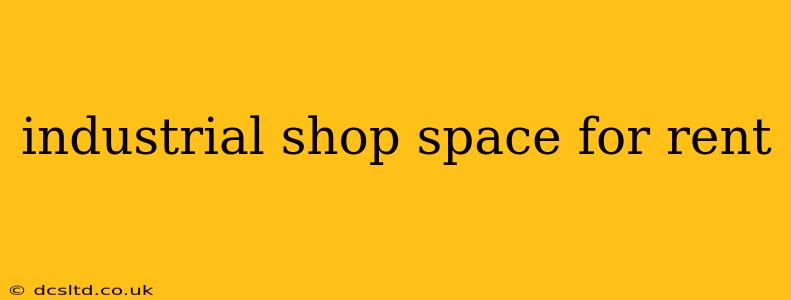Finding the right industrial shop space for rent can be a daunting task. The market is diverse, with options ranging from small workshops to expansive warehouses. This guide will walk you through the key considerations, helping you navigate the process and secure the ideal space for your business needs.
What are the Different Types of Industrial Shop Spaces Available for Rent?
Industrial shop spaces come in many forms, each catering to different operational requirements. Understanding these differences is crucial in your search. We can categorize them broadly as:
-
Small Workshops/Light Industrial Units: These spaces are typically smaller, suitable for businesses like artisans, small-scale manufacturing, or light assembly operations. They often have limited loading dock access and may not offer high ceilings.
-
Medium-Sized Industrial Units: These provide a balance between space and functionality, catering to businesses requiring more storage, heavier machinery, or increased production capacity. They usually offer better loading facilities and higher ceilings than smaller units.
-
Large Warehouses/Distribution Centers: These are expansive facilities designed for large-scale storage, distribution, and manufacturing. They feature significant square footage, high ceilings, multiple loading docks, and often specialized features like climate control or racking systems.
-
Flex Spaces: These hybrid spaces offer a blend of office and industrial areas, ideal for businesses requiring both administrative functions and manufacturing or storage capabilities.
What Factors Should I Consider When Choosing an Industrial Shop Space?
Selecting the right space requires careful consideration of several key factors:
Location, Location, Location:
Proximity to your target market, suppliers, transportation hubs (ports, airports, highways), and your workforce are paramount. Consider commuting times and accessibility for both employees and clients. Local zoning regulations and potential future development plans are also worth exploring.
Size and Layout:
Accurately assess your current and future space requirements. Consider machinery footprint, storage needs, and potential expansion. The layout should support efficient workflow and material handling.
Utilities and Amenities:
Check the availability and cost of utilities like electricity, gas, water, and high-speed internet. Amenities such as loading docks, HVAC systems, security systems, and parking should also be evaluated.
Lease Terms and Costs:
Carefully review lease terms, including lease duration, renewal options, and any clauses related to repairs, maintenance, and improvements. Compare rental rates across different properties and factor in additional costs like property taxes and insurance.
How Much Does Industrial Shop Space Rent Usually Cost?
Rental costs for industrial shop space vary significantly depending on location, size, amenities, and market conditions. Factors influencing price include:
- Location: Prime locations in urban areas or near transportation hubs command higher rents.
- Size: Larger spaces naturally cost more per square foot.
- Amenities: Spaces with advanced features like climate control, high ceilings, and loading docks will be more expensive.
- Market Conditions: Supply and demand play a significant role in determining rental rates.
It's recommended to consult with commercial real estate agents to get an accurate understanding of current market rates in your target area.
What are the Common Lease Terms for Industrial Shop Spaces?
Lease terms for industrial spaces typically range from 3 to 5 years, although shorter-term options may be available. Standard lease agreements cover responsibilities for repairs, maintenance, property taxes, and insurance. It's crucial to carefully review the entire lease agreement with legal counsel before signing.
What are the Benefits of Renting an Industrial Shop Space?
Renting offers several advantages over buying:
- Flexibility: Leases provide greater flexibility to adapt to changing business needs. You can adjust your space or relocate as your business grows or shrinks.
- Lower upfront costs: Renting eliminates the large capital investment required for purchasing a property.
- Predictable expenses: Monthly rent payments offer predictable budgeting.
- Reduced maintenance responsibilities: The landlord typically handles major repairs and maintenance.
By carefully considering these factors and conducting thorough research, you can successfully find the ideal industrial shop space to support your business growth. Remember to consult with real estate professionals experienced in the industrial market to guide you through the process.
